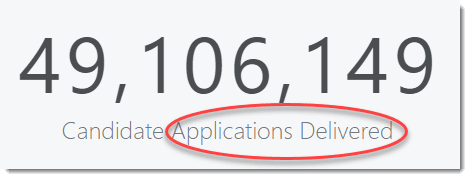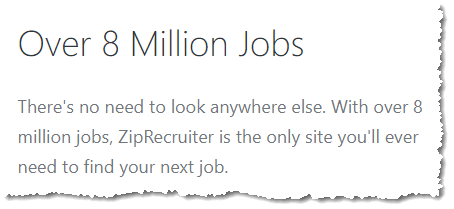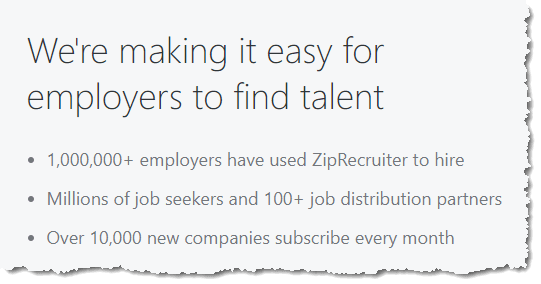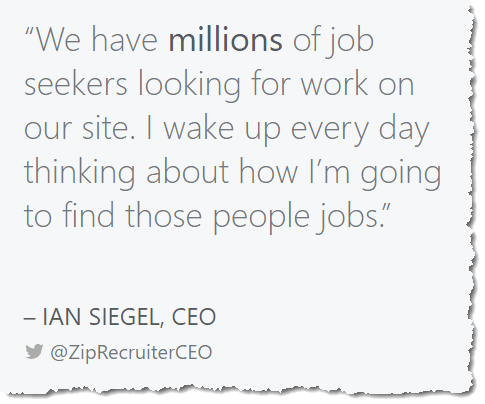In the September 25, 2018 Ask The Headhunter Newsletter an HR worker reveals how a faulty HR process led to a job offer being rescinded after the applicant quit his old job.
Question
I work in Human Resources (HR). During our on-boarding process, we send prospective employees for a drug screen and run a background investigation and, if the job requires driving, a motor vehicle record (MVR) check. The background is launched when the applicant electronically completes an authorization.
We had planned on hiring a guy, when three days before his start date he had still not signed the authorization. So I ran the part of the background that I already had authorization for, and saw that his MVR was horrible. He had DUIs, super-speeder violations and more.
He’s already given his notice to his old employer, and we can’t hire him. I think he avoided signing the background authorization to hide a bad record.
We had to rescind the position as we don’t have any positions for a non-driver. I feel bad about this but I also think he should take some of the responsibility. What do you think?
Nick’s Reply
It’s important to consider the critical path of your company’s hiring process. That is, which steps are critically dependent on earlier steps being completed satisfactorily? And, who is responsible for those?
The critical path to making a hire
You don’t say explicitly whether you made this applicant a bona fide job offer. But I think it’s fair to assume you did based on two other pieces of information you shared.
- You started the on-boarding process. You would not have done that without two critical steps being completed first. You had to extend a job offer and he had to accept it.
- He quit his old job. He would not have taken that critical step unless the two aforementioned critical actions were taken first — an offer was tendered and accepted.
Please note that I’m not putting any specific order on these critical steps, though of course there is a necessary order. In any case, when you made that job offer and it was accepted, you had a contract. The deal was done.
A job offer is a contract
So, where does that leave your company and the HR person who is responsible for the hiring process? In a bad, indefensible spot, I think. You made and broke an agreement. A rescinded job offer is a broken contract.
Two other critical steps in this hiring path are:
- Obtaining authorization to conduct a background investigation.
- Conducting the investigation.
Clearly, both of these critical steps must be done before you can hire anyone. And the investigation — a critical step — brought the entire process to a screeching halt when you discovered the problems, as it should. That’s why that step is on the critical path to hiring, right?
Where you blew it is that you apparently jumped ahead. You made an offer — a contract — before obtaining authorization to do the background check, and before you had any investigation results. You acted without due diligence.
Why would any employer do that?
Due diligence
See Fearless Job Hunting, Book 8: Play Hardball With Employers, p. 23.
The applicant’s mistake is that he followed your lead. He, too, failed to perform due diligence to ensure your company was acting in good faith. He didn’t double-check to make sure you had followed your own critical path before he took the ultimate critical step: He quit his job.
Why would any job applicant do that?
No job applicant can afford to quit their old job, or to trust an employer or HR rep, unless they are certain they have a bona fide job offer.
A bona fide job offer
A job offer is bona fide when it is:
- Neither specious nor counterfeit; genuine
- Made with earnest intent; sincere
- Made in good faith without fraud or deceit
You, as an HR representative, know your company cannot hire someone with a bad record. So, why did you make a job offer before checking? There’s no good faith when you lead someone to quit a job so they can start work with you — then pull the rug out from under them. (See HR Managers: Do your job, or get out.)
A rescinded offer is a broken contract
You said: “We had to rescind the position as we don’t have any positions for a non-driver.”
That’s not why you rescinded the offer. You rescinded because you didn’t do your job properly. The main fault is yours, and it could get your company sued. (For an attorney’s take on this, see Job offer rescinded after I quit my old job.)
You should never have made an offer before you conducted the investigation. The investigation came first on the critical path to making an offer, before the hire quit his other job, and before you began on-boarding the new hire.
Hire with integrity
A company should hire with integrity. It should follow a sound process that ensures a healthy deal will be struck that is good for both parties. That requires following a series of steps in proper order, to protect both parties. (See Protect yourself from exploding job offers.)
Here’s the critical path you should follow. Staple it to your office wall where you can see it all the time. Make sure everyone involved sees it in advance and signs off at each step. None of these steps should be taken until all previous ones have been completed:
- Make sure the position is open and fully funded with an appropriate salary and benefits.
- Conduct interviews.
- Decide your favored applicant is qualified and that you want to hire them.
- Conduct appropriate background investigation(s) after obtaining authorizations.
- Confirm that all information you need about the candidate has been gathered and logged.
- Make a bona fide offer in writing that includes all terms, signed by an authorized representative of the company.
- Confirm the candidate’s bona fide acceptance of the offer and terms in writing.
- Notify the candidate that the hire is confirmed and that they should resign their old job.
- Conduct your on-boarding process.
- New hire starts work.
The applicant was foolish to accept a job offer before confirming that your company’s critical path had been completed. He was disingenuous about not signing the authorization for the background investigation. He was downright stupid to quit his old job before ensuring the new job was solid.
So he, too, bears responsibility. Caveat emptor. But shame on you as the employer for letting the matter get to a point where you had to rescind the job offer.
The employer owns the hiring process
Your company is going to spend money to hire someone. You start the ball rolling and control the process. You own the process.
It doesn’t matter if your investigations reveal the candidate is an axe murderer. It’s still not his fault that you didn’t do your job prior to issuing a job offer. You failed to conduct due diligence (the checks and investigations). In this case, your process should have stopped dead at step (4.) above.
You tacitly if not explicitly encouraged him to quit his job and relinquish his pay based on your assurance (the job offer you gave him) that he could rely on you to hire him. No one deserves that. (If he’s an axe murderer and you don’t figure it out prior to making him an offer, then shame on you.)
Rescinding a job is not an option
Please review the 10 steps in the list above. Nowhere is there a “Rescind job offer” step. It’s a terribly embarrassing option. Rescinding a job offer is a last resort that you — and your company — will pay for with your reputations.
You need to sit down with your top management to develop a critical path to follow when hiring. The fact that you were three days from his start date when you figured all this out reveals a shocking problem at your company. (See Smart Hiring: A manager who respects applicants (Part 1).)
Rescinding a job offer that your company never should have made is unacceptable.
Is it ever legitimate to rescind an offer? When — and why? Have you ever rescinded a job offer that you made to an applicant? Have you ever had an offer pulled out from under you? Was it a legitimate action? What steps belong on the critical path to completing a hire and who is responsible for them?
: :





 6. “Because their technology is smart.”
6. “Because their technology is smart.” Zip offers no success-rate metrics (audited or otherwise) about hiring or getting hired. The guy in the commercial does that.
Zip offers no success-rate metrics (audited or otherwise) about hiring or getting hired. The guy in the commercial does that.
 Hank’s evil sister
Hank’s evil sister I’ve been in Human Resources 12 years and I have to say your article
I’ve been in Human Resources 12 years and I have to say your article  My suggestion to most businesses is that they can relieve their HR departments of recruiting, candidate selection and hiring functions without any significant loss. The HR function is Human Resources, not Human Recruiting. (See
My suggestion to most businesses is that they can relieve their HR departments of recruiting, candidate selection and hiring functions without any significant loss. The HR function is Human Resources, not Human Recruiting. (See  Job hunting has become incredibly frustrating. I have always said HR should never screen candidates, but it is reality and I have to face it. I am looking for a job and can’t get past the initial screening. People hiring for jobs I have done won’t talk to me. I just started using Jobscan to try to get through the initial screening. The word-match is ridiculous, but again it is reality.
Job hunting has become incredibly frustrating. I have always said HR should never screen candidates, but it is reality and I have to face it. I am looking for a job and can’t get past the initial screening. People hiring for jobs I have done won’t talk to me. I just started using Jobscan to try to get through the initial screening. The word-match is ridiculous, but again it is reality. Several companies and recruiters in the past year have reached out to me on LinkedIn regarding job opportunities. They do phone screens, tell me how great my experience is, love my ideas … then radio silence.
Several companies and recruiters in the past year have reached out to me on LinkedIn regarding job opportunities. They do phone screens, tell me how great my experience is, love my ideas … then radio silence.
 I dunno — maybe we should start Job Seekers Anonymous? It’s time we worked up a way to address employers who claim to want “exceptional talent” but expect you to turn off your talent and apply-for-jobs-by-numbers.
I dunno — maybe we should start Job Seekers Anonymous? It’s time we worked up a way to address employers who claim to want “exceptional talent” but expect you to turn off your talent and apply-for-jobs-by-numbers. “Hi, I’m Bill, a seasoned pro in [your field]. I’m interested in working for your company because it’s a shining light in our industry. But I’m puzzled by something. As a very busy [programmer, marketer, whatever] I don’t have time to waste with impersonal cattle-calls and online job forms, so I’m surprised your company is advertising rather than recruiting only the right people thoughtfully. I select potential employers very carefully. I’m ready to meet with your [marketing manager] to show how I can do the job to bring more profit to your bottom line.
“Hi, I’m Bill, a seasoned pro in [your field]. I’m interested in working for your company because it’s a shining light in our industry. But I’m puzzled by something. As a very busy [programmer, marketer, whatever] I don’t have time to waste with impersonal cattle-calls and online job forms, so I’m surprised your company is advertising rather than recruiting only the right people thoughtfully. I select potential employers very carefully. I’m ready to meet with your [marketing manager] to show how I can do the job to bring more profit to your bottom line.
 Nick, I need your help. I’m in a very tough spot with salary negotiations. HR told me the salary range for the position ($65K-$70K) on the phone before our interviews. T
Nick, I need your help. I’m in a very tough spot with salary negotiations. HR told me the salary range for the position ($65K-$70K) on the phone before our interviews. T

